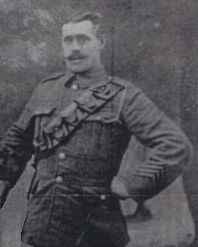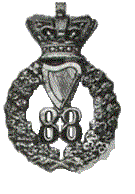|
|
|


|
Patrick McGrath served in the 88th Regiment of the Connaught Rangers.
The 88th was originally established in Connaught, Ireland, in 1793 and it bore on
its colours and appointments a harp and a crown with the motto Quis Separabit
– "Who shall divide us".
 Patrick McGrath After World War I was over, both battalions of The Connaught Rangers, 1 and 2, returned to the Army Depot at Dover, Kent, England; where their numbers were made up to full strength once more. The 1st Battalion then went to India in October 1919, and Patrick McGrath went with them. A mutiny arose amongst the Irish troops and 69 men were court-martialled. At Solan, 2 mutineers died whilst attacking the armoury, and 14 were sentenced to death. However, only the ring-leader of this rebellion, Private James Daly, was finally executed. It was an extreme provocation under which the rebellion was mounted by those Irishmen, hearing of the fate of their fellow-Irishmen at home, suffering at the hands of British soldiers of another regiment.
Following the mutiny, the entire 1st Battalion was sent to Rawalpindi and saw service there,
with no further rebellion.
In June 1922, both the 1st and 2nd Battalions returned to Britain. Their colours were then
laid up at Windsor, Berkshire. The Connaught Rangers were disbanded as a Regiment on
31 July 1922, after an outstanding record of uniformed military service over almost
230 years.
 88th Regiment It is many thousands of miles from Fermoy to Solan in the Punjab, India, but one Fermoy man who made the journey (at King George's expense) was 32292 Private Patrick McGrath of the Connaught Rangers. There he shared in the same fate as others in that Regiment who protested at what was being done to their countrymen in the King's name in their own homeland. On the night of July 1st 1920, Patrick McGrath was there in 'C Company' camp at Solan, seconding the proposals of James Daly who was afterwards put to death for inciting the protest. Patrick shared the fate of the rest of the mutineers, being sent to serve five long years' imprisonment, not to mention the tortures they had undergone in India while awaiting trial. With the rest of the protestors, he was released on the 3rd January 1923, six months after their Regiment had been disbanded in the previous June. Initially, their story was in the headlines of the press of Ireland for two days, but the mutineers were forgotten by those who formed the administration of the Irish Free State and by the Republicans who had challenged that administration, and for whom they suffered so much. Not until the late 1930's were they remembered when belatedly they were given a pittance of a pension. Patrick McGrath, of Connolly Street, Fermoy, died on 24th.August 1947. R.I.P. |
